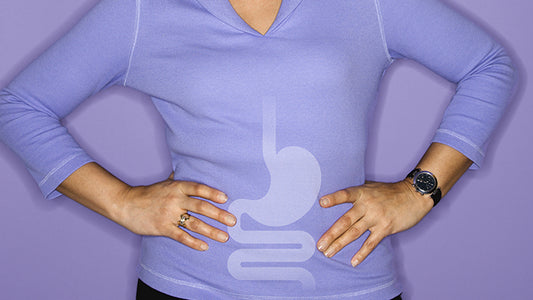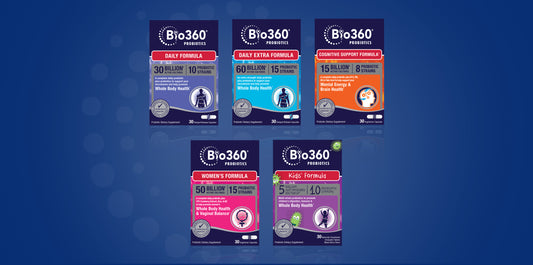
What are probiotics?
 by Dr. Émilie Desfossés-Foucault, Scientific Advisor
by Dr. Émilie Desfossés-Foucault, Scientific Advisor
Dr. Émilie Desfossés-Foucault is a microbiologist with a PhD in Food Science. She has postdoctoral training in the probiotic field and has extensive knowledge in food microbiology, probiotics, molecular biology, fermentation, and is also trained as a cheesemaker.
What Are Probiotics?
The Need-To-Know Guide to Probiotics
According to a study conducted in 2019, nearly 4 million people in the US alone are regularly taking probiotic supplements.¹ That's a lot of people, and if the past five years are any indication, that number will continue to grow.
Whether it's your first-time shopping for a probiotic supplement or you're building upon an existing health regimen, you might have a few questions. Which supplement should you be shopping for? What are CFUs? Will taking probiotics conflict with your diet?
The information available to you can feel a bit overwhelming, but worry not. The most important details are actually quite simple. So, first things first—what are probiotics?
What Are Probiotics?
Probiotics are live bacteria that have various health benefits for the body.² They are usually sourced from either dairy foods or dietary supplements and either replace or add to the beneficial bacteria normally present in the intestinal tract.
What Do They Do?
Probiotics are beneficial microorganisms that naturally live in your body. A majority of our resident bacteria is found in the gut, composing what is known as our gut microbiome. The gut microbiome affects and supports a variety of heath functions from head to toe. In fact, 70% of the immune system is in the gut and 90% of serotonin is produced first in the gut before it is sent to the brain.³
Digestive Health
Our digestive system is vitally important to a healthy body and affects everyday life. If our digestive health runs smoothly then chances are our general well-being will follow suit. Probiotics can offer comprehensive digestive support. However, it is important to utilize the correct strains and quantity for these benefits to be felt.
When considering a probiotic supplement for digestive health, consider a high-strength probiotic supplement.* Certain bacteria, including Lactobacillus plantarum, have been found to be effective in promoting digestive health. Additionally, pairing probiotic strains with prebiotics, such as inulin, can be beneficial.
Immune Health
70-80% of the immune system is influenced by the gut, where the bacteria within plays an important role in both the innate and adaptive immune responses.³ Therefore, a reduction in our resident supportive bacteria can lead to an impaired immune response. Rebuilding and re-enforcing our good bacteria is vital to rebuilding the integrity of the gut and supporting a healthy immune system.
Brain Health – The Gut-Brain Connection
Our resident bacteria can influence our mood and even our food choices. This is due in part to the influence that these bacteria have on the vagus nerve,⁴ which connects the gut to the brain and works like a busy telephone line sending lots of messages back and forth between them. Studies have shown that taking good bacteria can help support mood and cognitive health.⁵
Skin Health
The link between skin health and gut health is nothing new. Researchers, as far back as 1930, suspected a link between gut health and skin health and this has now been confirmed with modern research confirming the importance of this relationship.⁶
This important connection means that probiotics could be very helpful in promoting healthy skin. There has been a great deal of research carried out in the modern era into the specific good bacteria which could be helpful to restoring skin health.⁷
Women's Health
At some stage in their lives, a high proportion of women will suffer from the unpleasant effects of vaginal imbalance. The vagina of a healthy woman should contain high levels of lactobacillus and some bifidobacteria bacteria which support vaginal health and healthy pH levels.
How Do Probiotics Work?
Taking daily probiotic supplements, or consuming probiotic-rich foods and drinks, adds or replaces targeted strains of probiotic bacteria and yeasts to our body's microbiome. It's like taking a daily vitamin or nutrient—sometimes our bodies need extra support to sustain healthy functions and targeting those needs with specific probiotics can help support whole-body wellness.
And so Bio360® probiotic supplements were developed. A new line of science-backed targeted probiotic supplements carefully formulated to help support your overall wellness.* Each daily probiotic delivers a proprietary blend of probiotics, often accompanied by a mix of prebiotics and nutrients, to help support specific aspects of your health.* Bio360® probiotic formulas are boosted with nutrients special to areas of focus. For example:
| Cognitive Health Formula | Folic Acid | Vitamin B12 | Vitamin B6 | Vitamin B5 |
| Skin Health Formula | Copper | Zinc | Vitamin A | Dermaval™ antioxidant blend |
| Women's Health Formula | Cranberry Extract | Zinc | Vitamin B12 | |
| Immune Health Formula | Zinc | Copper | Vitamins C, A & D3 | Glutamine |
Our bodies already have billions of healthy bacterial cultures that compose the microbiome. Probiotics supplements work by providing the cultures that may not be fully present without extra support. When our diet isn't providing a complete balance of healthy bacteria, probiotic supplements can help balance our microbiome, which is key to whole-body wellness.
Probiotic Strains
Until now, we've simply referred to probiotics as "healthy bacterias." But what does that mean, specifically? Which probiotics are in Bio360® probiotic supplements, and which should you be looking for in your daily supplements? There are many probiotic strains in Bio360® probiotics, but here are a few of the most noteworthy:
Lactobacillus Strains
Lactobacillus strains are most commonly present in our intestines. There are hundreds of known Lactobacillus species, among which are some of the most thoroughly studied probiotic strains. Lactobacillus and Bifidobacterium strains have been shown to provide the most beneficial effects in helping to support mental energy and brain health.⁸
Bifidobacterium Strains
Like Lactobacillus strains, Bifidobacterium strains are often found in the digestive system and seem to show the most beneficial effects to help support mental energy and brain health.
Probiotics vs. Prebiotics
Remember, probiotics are living bacteria. Prebiotics, on the other hand, are types of dietary fiber that feed the friendly bacteria in your gut. When a daily supplement delivers both prebiotics and probiotics (called a synbiotic), the supplement now delivers living probiotic strains and the prebiotic components that will help stimulate new healthy bacteria growth. All in one daily supplement.
While the inclusion of prebiotics is not always necessary, they are a great way to spur healthy activity in the bacteria that is already present in our microbiome. Our Daily and Daily Extra Formula are each synbiotic blends of prebiotic and probiotic strains.
Sources of Probiotics
Probiotic supplements are one of the most effective ways to increase your probiotic intake in a significant way. However, probiotics are also found in many of the foods that we eat regularly. Dairy products like yogurt, buttermilk, and certain cheeses, as well as fermented foods like kimchi, sauerkraut, and pickled vegetables are naturally rich in probiotics.
Where some dietary limitations like lactose intolerance can prevent us from consuming natural sources of probiotics, Bio360® daily supplements can safely be added to nearly any diet and health regimen.*
As an added bonus, Bio360® probiotics come in easy-to-transport blister packs with no refrigeration required, making it even more convenient to add to an on-the-go lifestyle.
How Safe Are Probiotics?
Probiotics and prebiotics may cause side effects like bloating or diarrhea, especially for the first two weeks. Consumers should always consult with a health professional if they have health conditions.
Otherwise, Bio360® probiotic supplements are all natural, and backed by over 700 research studies. Each supplement is carefully formulated with a proprietary blend of probiotics, often in addition to prebiotics and other nutrients. Thanks to a vegan, dairy-free, gluten-free formula, our supplements can easily be added to nearly any vitamin regimen and diet.*
Looking for microbiome balance? Adding probiotic supplements to your daily routine may offer the support you've been seeking. For more information on Bio360® probiotic supplements, take this easy probiotic quiz and find the right probiotic supplement for you.**
1. Statistics from the national Health INTERVIEW Survey. (n.d.). Retrieved April 19, 2021, from https://www.nccih.nih.gov/health/statistics-from-the-national-health-interview-survey
2. Probiotics: What You Need To Know. (2019). NCCIH. https://www.nccih.nih.gov/health/probiotics-what-you-need-to-know
3. Vighi, G. et. al Allergy and the gastrointestinal system. Clinical & Experimental Immunology. 2008;153:3–6.
4. Stewart, L. (2020, August 28). What's the link between the brain, stress and the gut microbiome? Atlas Biomed blog | Take control of your health with no-nonsense news on lifestyle, gut microbes and genetics. https://atlasbiomed.com/blog/stress-anxiety-depression-microbiome/.
5. Efficacy and safety of the probiotic Saccharomyces boulardii for the prevention and therapy of gastrointestinal disorders; Therap Adv Gastroenterol. 2012 Mar; 5(2): 111–125.
6. Salem, I., Ramser, A., Isham, N., & Ghannoum, M. A. (2018). The Gut Microbiome as a Major Regulator of the Gut-Skin Axis. Frontiers in Microbiology, 9, 1459. https://doi.org/10.3389/fmicb.2018.01459
7. Leo Galland; The Gut Microbiome and the Brain; J Med Food. 2014 Dec.
8. The effects of probiotics on depressive symptoms in humans: a systematic review; Caroline J Wallace; Ann Gen Psychiatry 2017.
**If you are pregnant, breastfeeding, taking any prescription, medication or have a medical condition, consult your healthcare professional before taking this product.



